Euro Bus Expo 2022 packed full with new products and developments
By Jim Gibbins - 7th December 2022
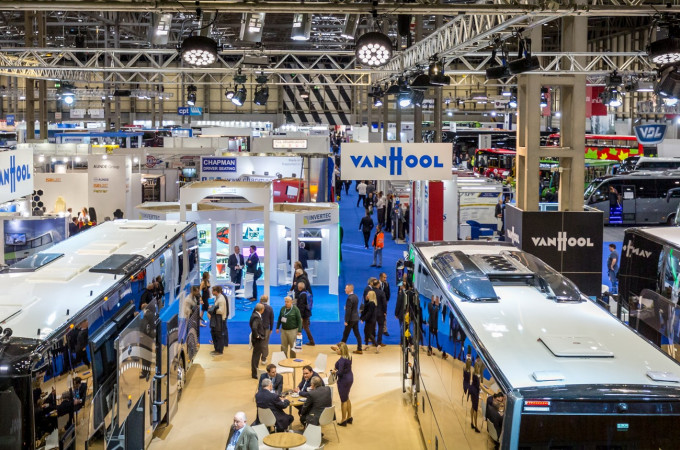
Euro Bus Expo 2022 - November 1-3, 2022
UK - EuroBusExpo 2022, Britain’s leading biennial bus and coach exhibition, took place for the first time after the Covid postponement at the NEC in Birmingham over three days in early November. The event, as well as affording many OEMs from across Europe the ability to display new models, was an opportunity for those in the industry to meet in person.
The first day afforded Truck & Bus Builder’s UK team to meet Imanol Rego, the new Irizar Group, CEO, who brings more than 20 years of experience in different senior management roles in several well-known companies (including CPE, Schneider Electric, and TE Connectivity); Rego returns to the Irizar Group having served previously as General Director of Irizar eMobility.
,-with-the-T&BB-team-at-Euro-Bus---Copy.jpg)
New CEO of Irizar Group, Imanol Rego (left), with the T&BB team at Euro Bus Expo 2022
The show saw the unveiling of Irizar’s 12-metre i.e., tram electric bus in right-hand-drive for the UK market, a vehicle and project which Rego had been personally involved in during his previous time at Irizar. He explained that the i.e., tram is the first of a range of buses that are planned to be manufactured for the UK and possibly for other right-hand-drive markets. This particular ‘tram’ bus, along with 19 others, is destined for service with operator Go Ahead, together with the charging infrastructure supplied by JEMA (also part of the Irizar Group), to electrify the South London 358 route.
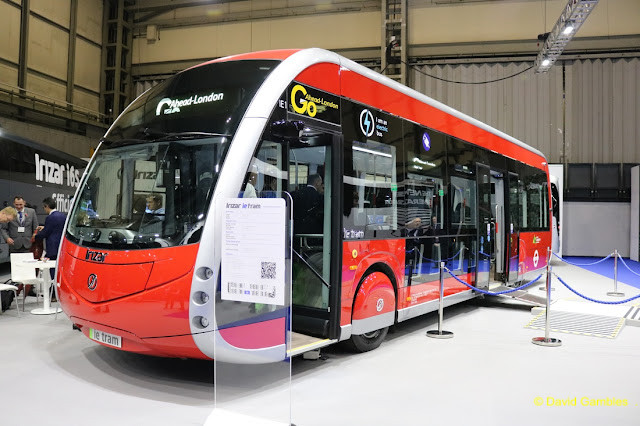
Irizar ie tram at Euro Bus Expo 2022
Besides the i.e., tram, the show was used by many to unveil new products for the here and now and for one or two years’ time. Equipmake unwrapped its repowered zero-emission version of the New Routemaster double-decker bus for the customer, Metroline. The retrofitting process replaces the vehicle’s previous hybrid drivetrain with a Zero Emission Drivetrain (ZED), which included Equipmake’s own HTM 3500 electric motor with torque and maximum power ratings of 3,500Nm @ 1,000 rev/min and 400kW. The repowered unit is fitted with a 400kWh battery enabling a range of up to 150 miles.
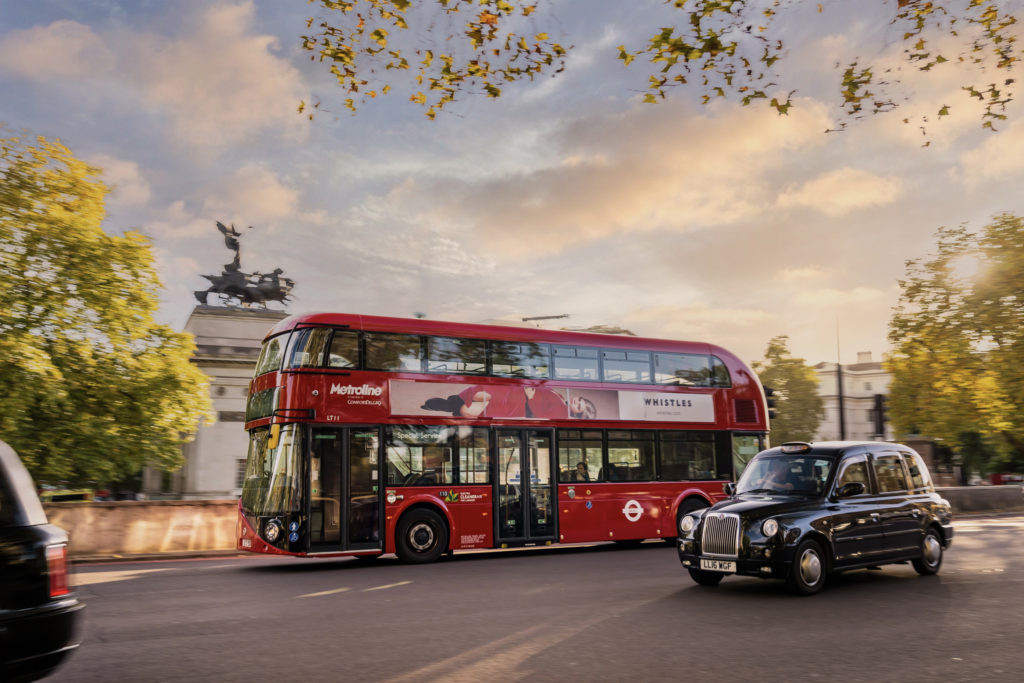
The Equipemake repowered Routemaster double-decker bus
On the Alexander Dennis stand was the next generation Enviro400FCEV hydrogen fuel-cell double-deck bus. The 11.1m long bus has a 300-mile range and can accommodate 88 passengers, up to 73 of them seated. It is fitted with the Voith Electrical Drive System (VEDS), which has a permanent magnet traction motor that offers peak power of 350kW. Refuelling takes five minutes through fillers on both sides with 29.4kg storage capacity at 350bar in NPROXX composite pressure vessels mounted at the rear of the vehicle. The hydrogen is converted to electricity using a Ballard FCmove-HD fuel cell power module that is rated at 45kW or 60kW depending on the operational application.
This was not the only ADL revelation, as it previewed virtual reality versions of new battery-electric city bus models, the Enviro400EV double-decker and the Enviro100EV in a new midibus length of 8.5m. The virtual presentation stated that initial orders had been taken already for both vehicles, and that the first vehicles would undergo testing in 2023 with plans to bring both to market in 2024. Both vehicles again utilise the Voith Electrical Drive System (VEDS) and the Alexander Dennis Battery system, which is supplied by the Polish company, Impact Clean Power Technology.
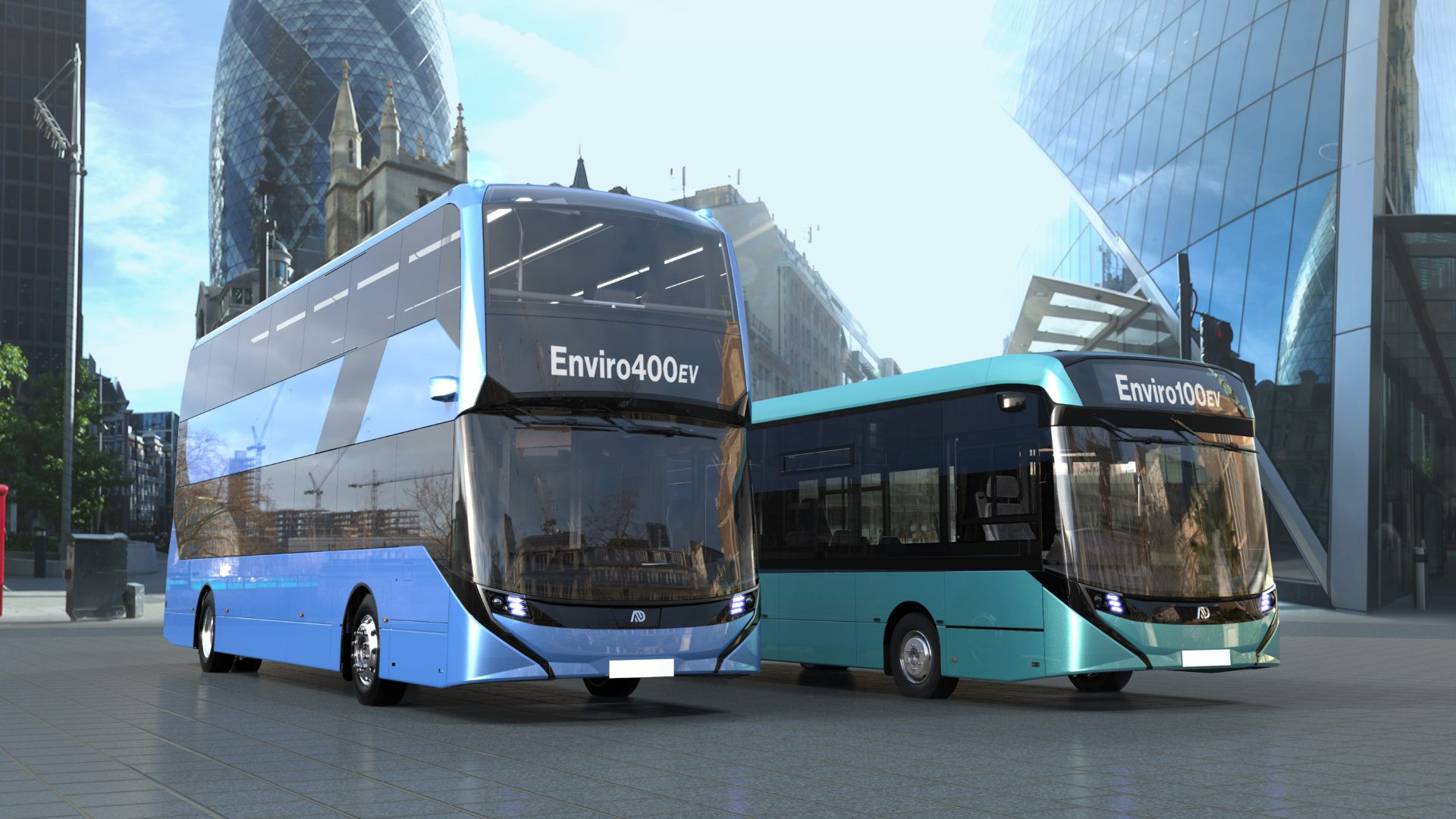
The new Alexander Dennis Enviro400EV and Enviro100EV
Austrian start-up, eVersum presented its zero-emission electric shuttle for inner-city and airport applications, available in three lengths: L1: 5.40m, L2: 6.90m, L3: 8.40m, with gross vehicle weights (GVW) from 7.5 to 12.0 tons and passenger capacities from 30 to 60 people, depending on the length. The powertrain is a 2-wheel drive e-motor with 177 kW, 650 V nominal and 1,430 Nm peak torque, provided a range of up to 300 km, powered by a fast charge enabled MpCO (Li-Ion NMC) or LTO battery with a capacity ranging from 58 to 174 kW/h.
The European e-charging suppliers were out in full force. Enel X along with local facilitator, ESP Utilities Group sponsored the ‘Zero Emission Zone’ at the Expo, which showcased the newest vehicles designed to decarbonise passenger travel, with Enel X supplying charging facilities for demonstrations of the latest carbon-free vehicles. JEMA had a strong presence, coming off the back of its recent contract with London bus operator, Go-Ahead, owned by Metrobus, to provide the electric charging for route number 358, a 16-mile bus route in the city of London. Heliox announced its presence in the UK with a stand at the show and recent contracts to install 140 new charging points for electric buses at three bus depots in Hamburg and Schleswig-Holstein, Germany, by 2023.
Among the many seat manufacturers present at the show, a less familiar face emerged: Meyis, a supplier of armrests, footrests, magazine nets, trays, and other seat accessories based in Bursa, Turkey. Meyis also make plastic seats for buses and trains. It counts Sunviauto and Kiel among its Tier 1 customers, but it is looking to expand its presence in the UK market under its own name.
Switch Mobility exhibited its ‘e1’ electric bus for the first time in the UK, which it launched in Paris back in June. The model displayed was an initial test bus in left hand drive with a plain white exterior and interior. A spokesman for Switch told T&BB that its electric buses employ either ZF hub motors or Dana axle motors, depending on the market and the demands of the customer. He said Switch is committed to a “global footprint” and “local manufacture and supply.”
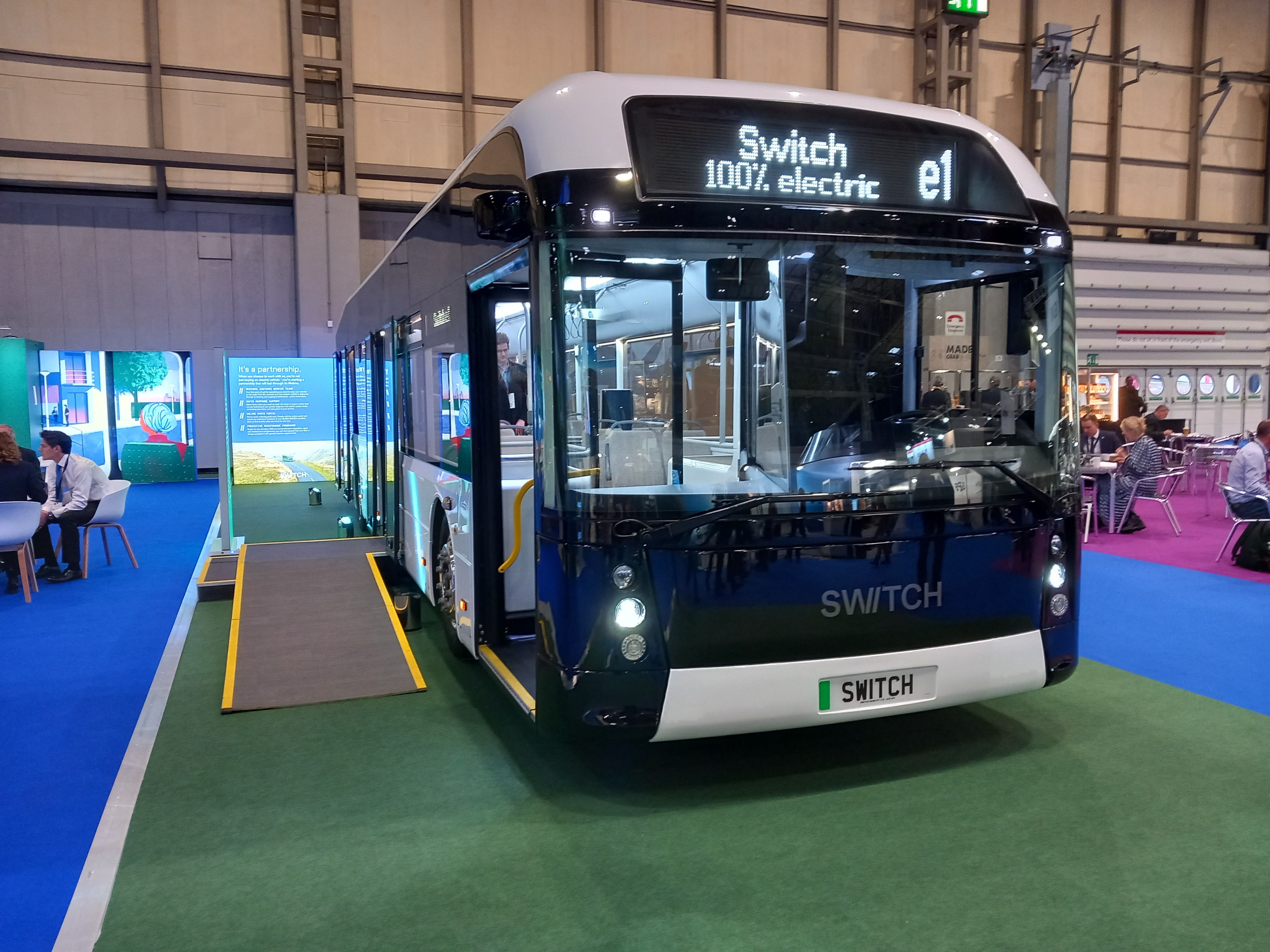
Switch Mobility e1 bus
When asked about the facility under construction in Valladolid, Spain, Switch’s spokesman said it should be ready sometime next year. The company’s intention is to build all e1 models there; in the meantime, the e1 is being made in the UK to European specifications.
Ventura Systems of Bolsward, Netherlands is a major supplier of automatic doors for bus manufacturers across the world. In the last five to six years, Ventura has expanded its presence in Australia, Singapore, Japan, and Germany, and has acquired sales partners in Poland, Turkey and Scandinavia.
At the show, Ventura presented some of its latest products. These include an automatic wheelchair ramp operated by an electric-hydraulic system, and various kinds of sliding automatic doors, including a full glass door and a set of doors with LED lighting, flashing between green and red to inform passengers when to board.
Speaking about the market, Ventura said that multiple changes have come about since the beginning of the COVID-19 pandemic. For example, the growing prevalence of mirror cameras, which replace conventional wing mirrors, has meant that automatic doors which slide open horizontally are now viable on a wider range of bus models. Having doors that open to the side instead of inwards creates more interior space for seats and passengers.
Ventura also noted that the last five years has seen a gradual shift from pneumatic to electric-powered doors. In 2017, roughly 20-30% of doors made by Ventura were electric; today, most of the doors it makes are electric. This change has happened in tandem with the growth of sales in Europe and elsewhere for buses with electric drivelines.
Among the many ingenious and abstruse technical innovations presented by start-up firms at the show, Seeing Machines of Canberra, Australia stood out with a product that could be appreciated on a visceral as well as a cerebral level. You are sat down in a vehicle seat facing a screen; you are told to let your mind wander and your eyes lose their focus; and – BUZZ – you are jerked rudely awake by the seat vibrating underneath you.
Seeing Machines’ technology monitors the driver’s eyes, facial expression, and even involuntary movements such as a tilt of the head. It uses such indications to judge whether the driver is losing focus and entering what is called a “microsleep”: a sudden and temporary lapse in consciousness that may only last for a few seconds, but which could lead to a collision if it happens while the driver is on the road.
Among the raft of measures which the EU plans to bring into effect in July 2024, one of them is the mandatory inclusion of safety features in all vehicles which alert drivers when they begin to drowse or get distracted. As such, Seeing Machines has said that it is in talks with multiple OEMs, including Switch and Tevva, about incorporating its technology in next generation vehicle models.


